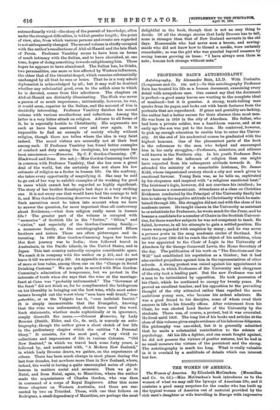PROFESSOR BAIN'S AUTOBIOGRAPHY.
Autobiography. By Alexander Bain, LL.D. With Portraits. (Longmans and Co. 14s. net.)—In this autobiography Professor Bain has treated his life as a human document, examining every detail with scrupulous care. One cannot say that the document is perfect—a good many leaves are wanting to the complete ideal of manhood—but it is genuine. A strong, truth-telling man speaks from its pages, and looks out with harsh features from the portraits that are reproduced. If grace and geniality are lacking, the author had a better excuse for their absence than most men. He was born in 1818 in the city of Aberdeen. His father, who had been a private soldier, was a hand-loom weaver, and at an early age the eon was put to the loom. He contrived, however, to pick up enough education to enable him to enter the Univer- sity. At the end of his academical course he graduated with tho highest honours. One of the pleasantest parts of the book is the references to the men who helped and encouraged him in his early struggles,—Professors, ministers, and citizens well known in the Northern city. In his youth Professor Bain was more under the influence of religion than one might have expected from his subsequent attitude towards it. Ho attended the ministry of a remarkable Irishman, Dr. James Kidd, whose impassioned oratory shook a city not much given to emotional fervour. Young Bain was, as he tells 1113, captivated by his eloquence and inspired with "a religious emotional heat." The Irishman's logic, however, did not convince his intellect; he never became a communicant. Attendance at a class on Christian Evidences conducted by the Principal of the University finally led him to take up the negative attitude to Christianity which he main- tained through life. His struggles did not end with the close of his academic career. He taught classes in the University as assistant to or substitute for Professors; he wrote much for the Press; and he beaame a candidate for a number of Chairs in the Scottish Universi- ties, for there were few subjects he was not competent to teach. He failed, however, in all his attempts to gain a settled position. His views were regarded with suspicion by many ; and he was never a persona grata in the snug academic circles of Scotland. Not until the year 1860 did he reach the object of his ambition, when he was appointed to the Chair of Logic in the University of Aberdeen by Sir George Cornewall Lewis, the Home Secretary of the day. The publication of his work on "The Emotions and the Will" had established his reputation as a thinker; but it had also excited prejudices against him in the representatives of other schools. A strong protest was raised against his appointment in Aberdeen, in which Professors of the University and clergymen of the city took a leading part. But the new Professor was not a man to be intimidated by opposition. He took possession of his Chair, which he continued to occupy for twenty years. He proved an excellent teacher, and his opposition to the prevailing thought of the city attracted rather than repelled the more ambitious young men, who became his ardent admirers. He was a good friend to his disciples, some of whom owed their success in life to his friendly offices. After retirement from his Chair, he was elected Lord Rector of the University by the students. There was, of coarse, a protest, but it was overruled. He lived until 1903. The long list of his books and articles at the close of this volume gives ample evidence of his laborious diligence. His philosophy was one-sided, but it is generally admitted that he made a substantial contribution to the science of psychology. All his life a fighter, and one much fought against, he did not possess the virtues of gentler natures, but he had in no small measure the virtues of the persistent and the strong. The autobiography is much too long. What is really valuable in it is overlaid by a multitude of details which can interest but few.


















































 Previous page
Previous page